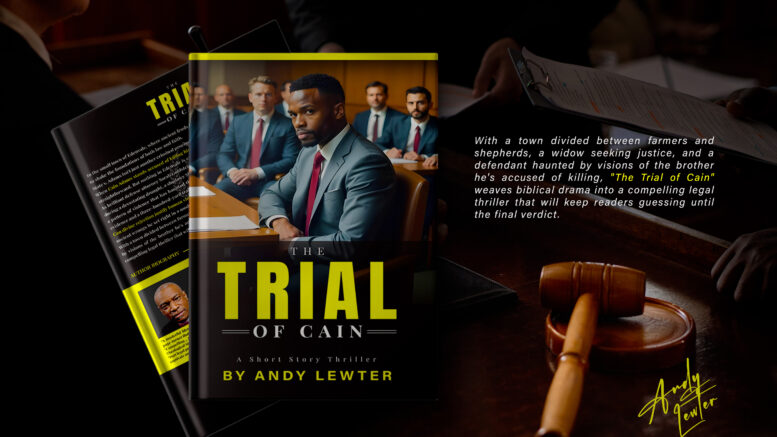In an era where biblical literacy is declining and younger generations are increasingly disconnected from traditional religious education, innovative approaches to sharing timeless scriptural narratives are emerging. Leading this creative revolution is our own Bishop Andy C. Lewter, whose groundbreaking work “The Trial of Cain” represents a bold new direction in religious storytelling.
“Today’s young people may never pick up a Bible, but they’ll binge-watch legal dramas on streaming services,” explains Bishop Lewter, a Harvard Divinity School graduate who has served our community for over fifty years. “By recasting these ancient stories in contemporary settings, we can make their eternal truths accessible to a generation that might otherwise never encounter them.”
His latest work transforms the biblical story of Cain and Abel into a gripping legal thriller set in modern-day America. The ancient tale of brotherly rivalry, divine favor, and the first murder becomes a complex exploration of land rights, family dynamics, and generational trauma, all playing out in a contemporary courtroom.
“The genius of Bishop Lewter’s approach lies in how he preserves the essential spiritual and moral questions while wrapping them in familiar modern contexts,” notes Dr. Patricia Wilson, professor of Religious Studies at State University. “Questions about divine favor, human jealousy, and the consequences of violence remain at the heart of the story, but they’re explored through the lens of forensic evidence, psychological testimony, and legal procedure.”
The adaptation demonstrates how ancient themes resonate with contemporary issues. The biblical conflict between farmers and shepherds becomes a generational land dispute that divides a community. Divine favor and rejection are examined through the prism of modern psychology and family dynamics. The mark of Cain is reimagined as the weight of justice and redemption in our legal system.
“Young readers who might struggle with the sparse, ancient text of Genesis can connect with these characters as real people facing real challenges,” says Sarah Martinez, a high school English teacher who has incorporated “The Trial of Cain” into her curriculum. “The legal framework makes the moral complexity of the story accessible to students who’ve grown up watching courtroom dramas.”
Bishop Lewter’s approach opens new possibilities for sharing other biblical narratives. Imagine the exodus story as a human rights campaign, David and Goliath as a corporate whistleblower tale, or the prodigal son as a modern family drama. Each retelling can preserve the spiritual core while creating new points of connection for contemporary audiences.
“These aren’t just stories about ancient people in distant lands,” Bishop Lewter emphasizes. “They’re about human nature, divine grace, and eternal truths that speak to every generation. Sometimes we just need to translate them into a language modern hearts can understand.”
The success of “The Trial of Cain” suggests a hungry audience for these reimagined narratives. In a world where traditional religious education is declining, such creative approaches may become crucial bridges between ancient wisdom and modern seekers.
“The challenge,” Bishop Lewter notes, “is to remain faithful to the essential truth of scripture while finding fresh ways to make it relevant. These stories have survived thousands of years because they speak to something fundamental in the human experience. Our job is to help new generations hear them speak.”
As our community considers new ways to share faith with future generations, Bishop Lewter’s innovative approach offers a promising path forward. By reimagining ancient stories in contemporary settings, we may help eternal truths find new life in modern hearts.
For those interested in exploring this new genre of biblical retelling, “The Trial of Cain” is available Amazon as a paperback and E-Book.

Be the first to comment on "Making Ancient Stories Speak to Modern Hearts: A New Approach to Biblical Storytelling"